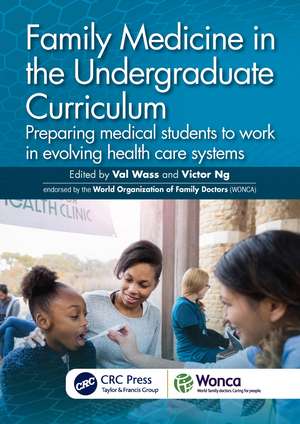Family Medicine in the Undergraduate Curriculum: Preparing medical students to work in evolving health care systems: WONCA Family Medicine
Editat de Val Wass, Victor Ngen Limba Engleză Paperback – 6 oct 2023
This practical guide is the first designed specifically to support those planning and conducting family medicine/primary care education within medical schools around the world. It offers medical educators a collection of concise easy to follow chapters, guiding the reader through the curriculum requirements with key references for further detail. Plain English and practical, deliverable advice, adaptable to different contexts, ensures the content is accessible to those educating medical students in any country, while the structure within sections ensures that family medicine doctors and educators can dip into chapters relevant to their roles, for example curriculum design for academic educators or teaching methods for those educating in clinical practice.
Key Features
■ The first “how-to” guide dedicated to effective integration of family medicine teaching into medical school curricula
■ Offers a strong evidence-based framework for integrating family medicine into medical schools
■ Wide in scope, for academics and educationalists at all levels and in all geographies, reflecting and embracing the experience and variation in family medicine across the globe to produce pragmatic and effective information on which medical schools can base change
■ Step-by-step introduction to the processes of literature review (establishing the existing knowledge base), choosing a topic, research questions, and methodology, conducting research, and disseminating results
■ Supported by the WONCA Working Party on Education
The book is edited and authored by members of the World Organization of Family Doctors (WONCA) Working Party on Education, which is ideally placed to offer a strong platform for medical schools to integrate family medicine whatever the local context, enabling all future doctors, whatever their career aspiration, to understand the importance of family medicine to health systems and holistic medicine and encourage family medicine doctors to inspire students to consider a career in the field.
| Toate formatele și edițiile | Preț | Express |
|---|---|---|
| Paperback (1) | 281.72 lei 6-8 săpt. | |
| CRC Press – 6 oct 2023 | 281.72 lei 6-8 săpt. | |
| Hardback (1) | 1067.49 lei 6-8 săpt. | |
| CRC Press – 6 oct 2023 | 1067.49 lei 6-8 săpt. |
Preț: 281.72 lei
Nou
Puncte Express: 423
Preț estimativ în valută:
53.91€ • 56.08$ • 44.51£
53.91€ • 56.08$ • 44.51£
Carte tipărită la comandă
Livrare economică 14-28 aprilie
Preluare comenzi: 021 569.72.76
Specificații
ISBN-13: 9781032351841
ISBN-10: 1032351845
Pagini: 300
Ilustrații: 16 Tables, black and white; 8 Line drawings, color; 10 Line drawings, black and white; 8 Illustrations, color; 10 Illustrations, black and white
Dimensiuni: 174 x 246 x 21 mm
Greutate: 0.49 kg
Ediția:1
Editura: CRC Press
Colecția CRC Press
Seria WONCA Family Medicine
ISBN-10: 1032351845
Pagini: 300
Ilustrații: 16 Tables, black and white; 8 Line drawings, color; 10 Line drawings, black and white; 8 Illustrations, color; 10 Illustrations, black and white
Dimensiuni: 174 x 246 x 21 mm
Greutate: 0.49 kg
Ediția:1
Editura: CRC Press
Colecția CRC Press
Seria WONCA Family Medicine
Public țintă
Postgraduate, Professional, and Professional Practice & DevelopmentNotă biografică
Val Wass OBE FRCGP FRCP MHPE PhD Professor of Medical Education in Primary Care, Aberdeen University; Emeritus Professor of Medical Education, Faculty of Medicine & Health, Keele University, UK; Former Chair, WONCA Working Party on Education
Victor Ng MD CCFP(EM) MHPE FCFP ICD.D Assistant Dean Schulich School of Medicine and Dentistry, Western Canada; Associate Director, The College of Family Physicians of Canada; Chair, WONCA Working Party on Education
Victor Ng MD CCFP(EM) MHPE FCFP ICD.D Assistant Dean Schulich School of Medicine and Dentistry, Western Canada; Associate Director, The College of Family Physicians of Canada; Chair, WONCA Working Party on Education
Cuprins
Section I - Integrating FM into the UG curriculum: Seizing the opportunity
- Changing healthcare: Building the evidence for generalism
- Defining family medicine
- Social accountability
- Developing an appropriate workforce for the future
- Academic primary care: The importance of family medicine leaders and role models
- Barriers for change and how to overcome theseSection II - What to aim for: Principles of curriculum design
- Humanism in family medicine
- Addressing population needs
- Addressing patient and family needs
- Competency-based curricula
- Designing an integrated curriculum
- Values-based education: Integrating professionalism into the curriculum
- The formal, informal, and hidden curriculaSection III - Integrating FM into the curriculum: how to achieve this
- Selecting for medical school entry: Nature or nurture?
- Early exposure to family medicine
- Family medicine placements: Apprenticeship learning
- Longitudinal integrated clerkships
- Interprofessional learning
- Experiential learning for undergraduate medical students Section IV - Teaching and learning: Methodologies
- Blended learning
- Clinical reasoning
- Communication skills
- Clinical and procedural skills
- Handling risk, uncertainty, and complexity
- Well-being
- Supervision, mentorship, and coaching
- Assessing clinical competencySection V - Assessment
- The principles of feedback
- Principles of assessment and assessment tools
- Struggling students and fitness to practise
- Quality improvement and evaluationSection VI - Evaluating teaching and learning across the curriculum
- Evidence-based practice: Medical education research
- Faculty development and continuous professional development
Descriere
This practical guide is designed specifically to support those planning and conducting family medicine/primary care education within medical schools around the world. It offers medical educators a collection of pithy, easy to follow chapters, guiding the reader through the curriculum requirements with key references for further detail.











